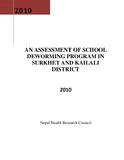Please use this identifier to cite or link to this item:
https://hdl.handle.net/20.500.14356/649Full metadata record
| DC Field | Value | Language |
|---|---|---|
| dc.contributor.author | Nepal Health Research Council (NHRC) | - |
| dc.date.accessioned | 2012-12-28T05:58:42Z | - |
| dc.date.accessioned | 2022-11-08T10:17:41Z | - |
| dc.date.available | 2012-12-28T05:58:42Z | - |
| dc.date.available | 2022-11-08T10:17:41Z | - |
| dc.date.issued | 2010 | - |
| dc.identifier.uri | http://103.69.126.140:8080/handle/20.500.14356/649 | - |
| dc.description | Globally, one fourth of the people is infected with intestinal helminth and is particularly prevalent among school-aged children in developing countries, which produce adverse negative impacts on education, health, growth, and school performance of the children. In Nepal School deworming program was started in fiscal year 2063/64 but till date there is no study conducted to see the coverage as well as the acceptance and effectiveness of the program. Hence, this type of assessment on one hand will provide the evidence of success of the program and in other hand will open door for evidence based design and effective implementation of more of such program. This study was carried out to find out the coverage, perception, acceptability and effectiveness of school deworming program in hilly and terai part of mid-western and far western Nepal. It aims to provide policy makers and health sector personnel with greater understanding of current situation of school deworming program. This can help them in formulating plans for achieving optimal coverage as well as more acceptability and effectiveness of the program which help to improved health of school children. An assessment was done in Surkhet and Kailali District of mid and far western development region of Nepal. A total of 10% of all primary schools of Surkhet and Kailali District were selected randomly. All together 83 school teacher and 493 parents were included in the study. One key informant was selected from each District Public Health Office (DPHO) and District Education Office (DEO). The data collection tool for the interview was comprised of pre-designed semi-structured questionnaire as per the objective of the study. Moreover, the record on school deworming programme was reviewed to collect the data on deworming coverage from school/health institution record. | en_US |
| dc.language.iso | en_US | en_US |
| dc.publisher | Nepal Health Research Council | en_US |
| dc.subject | School Deworming Program | en_US |
| dc.title | An Assessment of School Deworming Program in Surkhet and Kailali District | en_US |
| dc.type | Technical Report | en_US |
| Appears in Collections: | NHRC Research Report | |
Items in DSpace are protected by copyright, with all rights reserved, unless otherwise indicated.

